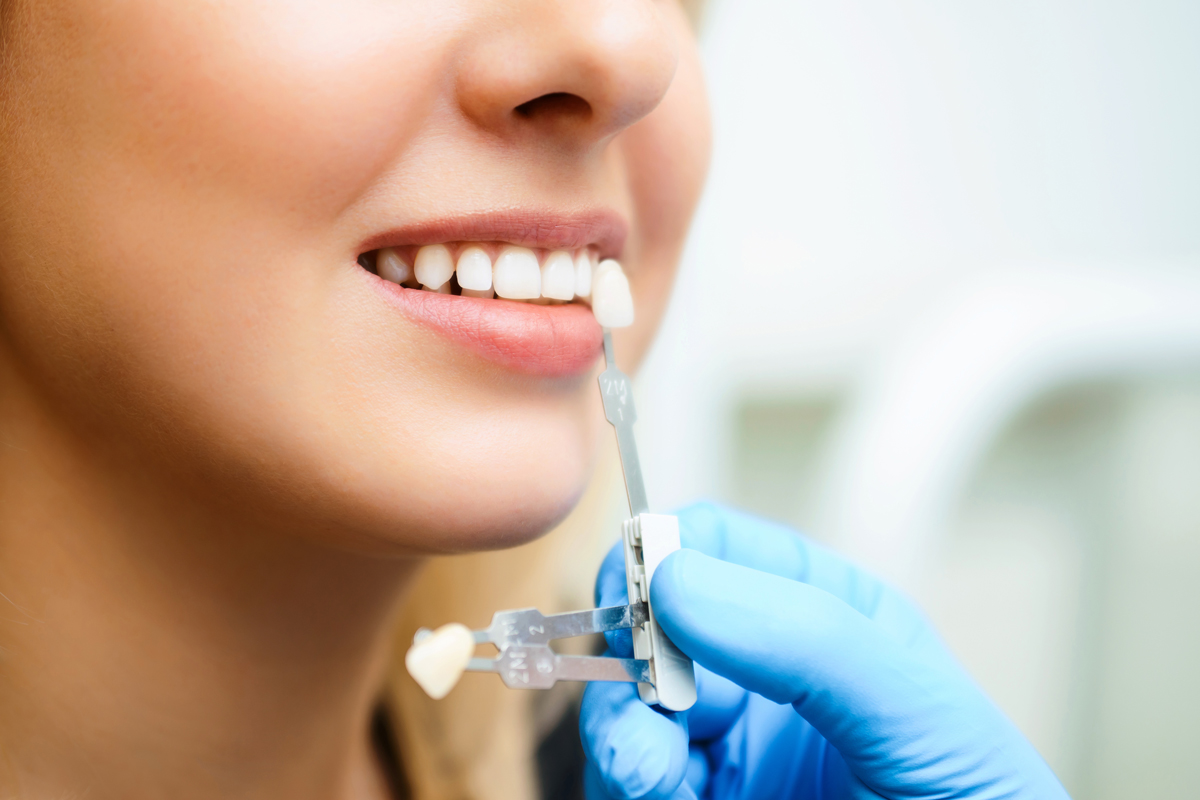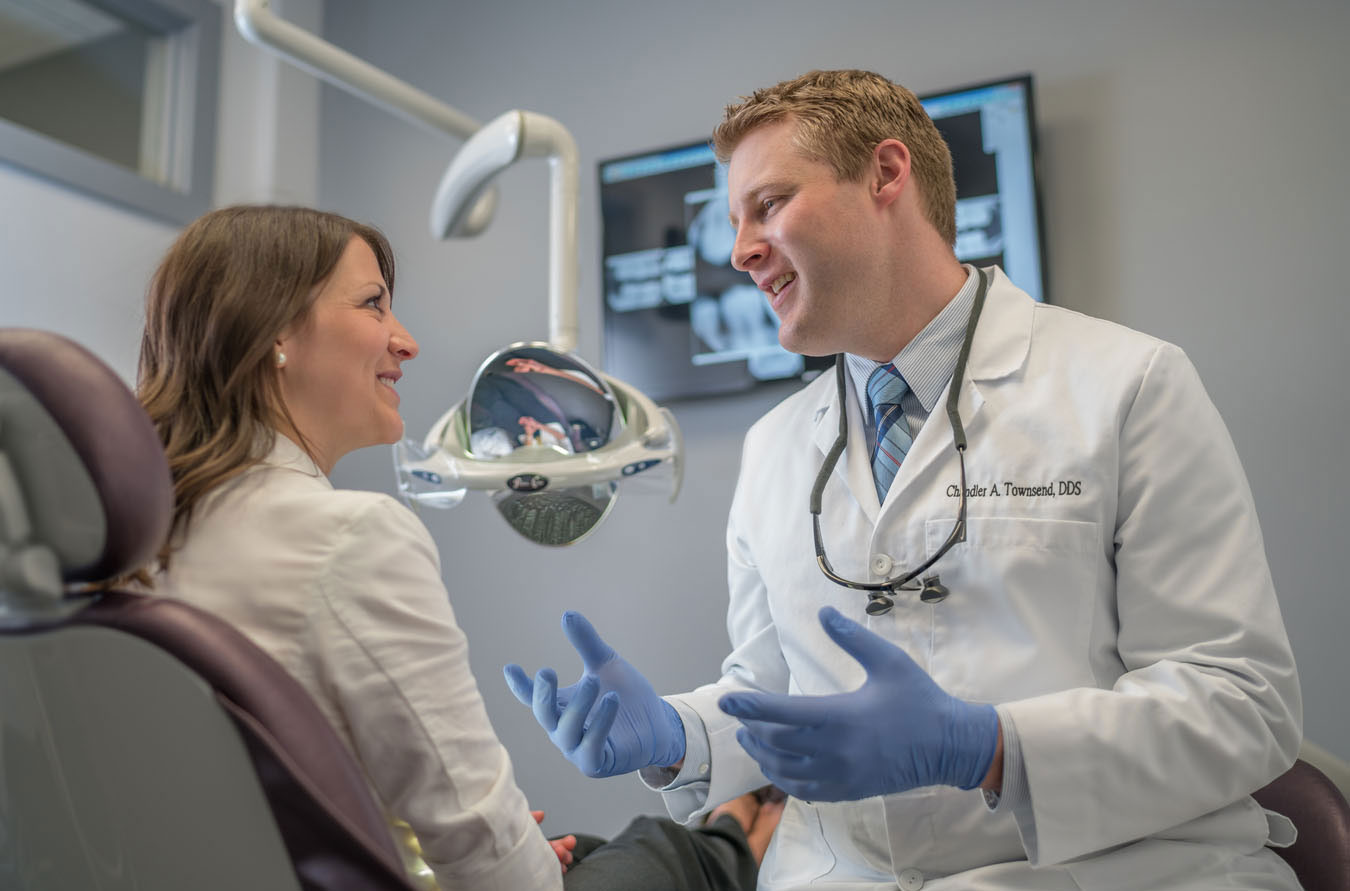
Pain found around and on the tooth is often referred to as dentin hypersensitivity. The dentin is the internal layer of the tooth that rests under the enamel. Because it is so close to many delicate nerve endings, it is often the source of discomfort. Whitening treatments and their accompanying chemicals penetrate the layers of the tooth, disturbing the sensitive dentin layer. This is why many people report some pain in their mouth following a teeth whitening treatment. Generally, this only lasts a few days.
Why Does Teeth Whitening Hurt?
The whitening agents used in the professional cosmetic teeth whitening process, usually hydrogen peroxide, penetrate the pores of the teeth to lift stains. In this process, the enamel is weakened and the dentin layer is exposed. Because of this, some people report dental discomfort during and shortly after their whitening treatment. However, some people do not experience discomfort or pain during or after their appointments. It depends entirely from person to person.

Teeth Whitening Pain vs. Other Tooth Pain
While teeth whitening has been known to cause discomfort, it is important to be aware of the difference between post-whitening treatment pain and tooth pain caused by something else. If your tooth pain is unrelated to teeth whitening, something else could be harming your oral health.
Common Teeth Whitening Procedure Pain Symptoms
Symptoms of discomfort are common side effects after professional teeth whitening. Generally, these feelings of pain will fade in 2-3 days, and for some, after about a week.
- Tooth sensitivity. Tooth sensitivity is the most common symptom after teeth whitening treatments. This occurs because the dentin is exposed causing the teeth to be more vulnerable.
- Discomfort when eating/drinking. Because the teeth are sensitive after teeth whitening, eating and drinking can irritate the weakened enamel. Eating foods that are either too hot or too cold can cause additional discomfort.
- Toothache. A dull toothache is common after getting teeth professionally whitened. This type of pain is generally nothing to worry about and should fade in a few days following the procedure.
Common Tooth Pain Symptoms
Pain unrelated to teeth whitening sensitivity can indicate a tooth or gum infection, a cavity, or other damage. If you’re experiencing these symptoms for more than a few days, it is best to see your dentist.
- Sharp/throbbing pain. Sharp, throbbing, constant pain is indicative of a problem with the health of the tooth. This kind of pain is often caused by something other than teeth whitening. For some, the pain emerges when biting down or putting pressure on the tooth.
- Tooth swelling. Swelling around the tooth usually means that gums that wrap around the crown are irritated. Gum health is directly related to tooth health, thus it is important to be aware of potentially infected gums.
- Foul taste/smell. A foul odor or taste in the mouth can be a symptom of an infected tooth. When the teeth become infected they will occasionally release drainage that causes bad breath and an unpleasant taste in the mouth.
- Accompanying fever. When tooth health starts to decline, the body’s defense systems spring to action. Often, when trying to fight off an upcoming infection, the body will spark a fever to activate the immune system and kill off the bacteria.
How to Alleviate Teeth Whitening Procedure Pain
Unfortunately, many people will experience a bit of discomfort after their whitening treatment. While this pain is usually short-lived, there are ways to alleviate symptoms for a more enjoyable recovery period.
Before Your Appointment
While these steps aren’t necessary, some people prefer to take these precautions in advance to avoid any potential discomfort.
- Desensitizing gel. Desensitizing gel is used to diminish the effects of harsh chemicals on the teeth. It is generally used to make teeth less vulnerable to discomfort. This gel should be applied right before your appointment for maximum effectiveness.
- Desensitizing toothpaste. Similar to desensitizing gel, desensitizing toothpaste is used to prepare teeth to block the pain from the outside of the tooth to the inner nerves. However, desensitizing toothpaste should be used starting 10 days before your appointment.
- Over-the-counter pain medication. Over-the-counter pain medications, like ibuprofen or acetaminophen, can be used to preemptively block pain signals to the brain. This way, when the discomfort arises, it is dulled or eliminated by the medication.
After Your Appointment
After your appointment, if you’re experiencing some pain you can take these measures to avoid exacerbating your discomfort.

- Avoid foods with strong temperatures. Foods that are too hot or too cold can irritate the weakened tooth. These extremes in temperature can stimulate the nerves causing discomfort.
- Be careful with brushing. Because the enamel is weakened and the dentin is exposed, the tooth itself is vulnerable. Brushing too aggressively shortly after teeth whitening can further aggravate the existing pain in the tooth.
- Use a straw. To avoid any too cold or too hot liquids touching the teeth, try drinking through a straw. This helps eliminate any contact that the food or drink could have with your teeth. Additionally, using a straw can help with premature staining after the treatment.
Conclusion
Professional teeth whitening is a healthy and harmless way to brighten up your smile. Though it may cause some temporary discomfort to the teeth and mouth, it should resolve itself within 2-3 days following the treatment. For pain that lasts longer, contact your dentist or dentist’s office. Abundant Dental offers premier cosmetic teeth whitening products and services with an experienced and trained staff. Our dentists are ready to answer any and all your questions regarding your treatment and aftercare. Call us today to make an appointment!
